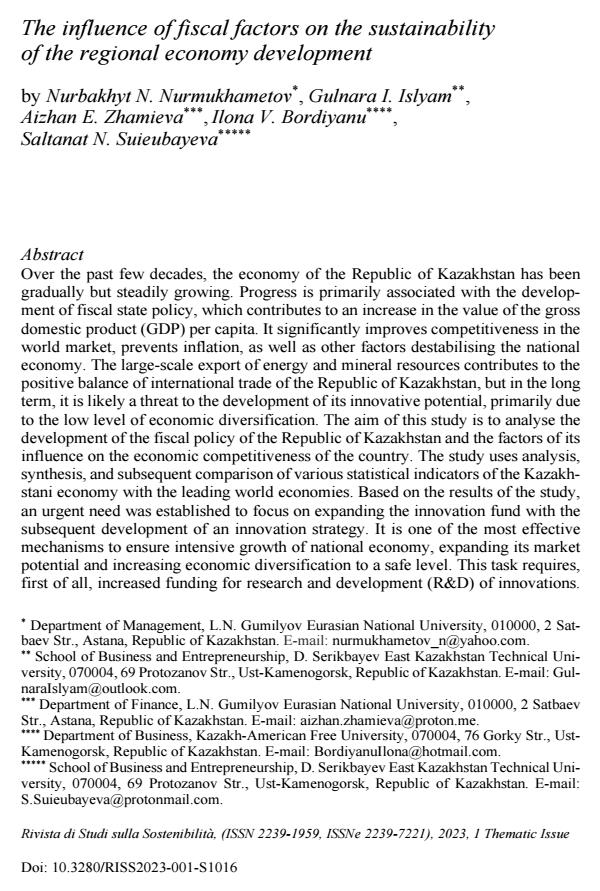The influence of fiscal factors on the sustainability of the regional economy development
Titolo Rivista RIVISTA DI STUDI SULLA SOSTENIBILITA'
Autori/Curatori Nurbakhyt N. Nurmukhametov, Gulnara I. Islyam, Aizhan E. Zhamieva, Ilona V. Bordiyanu, Saltanat N. Suieubayeva
Anno di pubblicazione 2023 Fascicolo 2023/1 T.
Lingua Inglese Numero pagine 17 P. 249-265 Dimensione file 143 KB
DOI 10.3280/RISS2023-001-S1016
Il DOI è il codice a barre della proprietà intellettuale: per saperne di più
clicca qui
Qui sotto puoi vedere in anteprima la prima pagina di questo articolo.
Se questo articolo ti interessa, lo puoi acquistare (e scaricare in formato pdf) seguendo le facili indicazioni per acquistare il download credit. Acquista Download Credits per scaricare questo Articolo in formato PDF

FrancoAngeli è membro della Publishers International Linking Association, Inc (PILA), associazione indipendente e non profit per facilitare (attraverso i servizi tecnologici implementati da CrossRef.org) l’accesso degli studiosi ai contenuti digitali nelle pubblicazioni professionali e scientifiche.
Over the past few decades, the economy of the Republic of Kazakhstan has been gradually but steadily growing. Progress is primarily associated with the develop- ment of fiscal state policy, which contributes to an increase in the value of the gross domestic product (GDP) per capita. It significantly improves competitiveness in the world market, prevents inflation, as well as other factors destabilising the national economy. The large-scale export of energy and mineral resources contributes to the positive balance of international trade of the Republic of Kazakhstan, but in the long term, it is likely a threat to the development of its innovative potential, primarily due to the low level of economic diversification. The aim of this study is to analyse the development of the fiscal policy of the Republic of Kazakhstan and the factors of its influence on the economic competitiveness of the country. The study uses analysis, synthesis, and subsequent comparison of various statistical indicators of the Kazakh- stani economy with the leading world economies. Based on the results of the study, an urgent need was established to focus on expanding the innovation fund with the subsequent development of an innovation strategy. It is one of the most effective mechanisms to ensure intensive growth of national economy, expanding its market potential and increasing economic diversification to a safe level. This task requires, first of all, increased funding for research and development (R&D) of innovations. The paper will be useful to researchers and specialists in the field of economics for forecasting and analysing its further development in the Republic of Kazakhstan.
Parole chiave:fiscal policy, government budget, gross domestic product (GDP), diver- sification of industries, macroeconomics, services.
- Developing a system for assessing the activities of public administration bodies in public relations Tetyana I. Pakhomova , Ella V. Mamontova , Mariia H. Tsedik , Larysa V. Kurnosenko , Karina Ya. Kucheriava , in Salud, Ciencia y Tecnología - Serie de Conferencias /2024
DOI: 10.56294/sctconf2024.764 - Current issues of agricultural land transfer in the Republic of Kazakhstan Olessya Mukhamediyarova, Svetlana Moroz, Saida Akimbekova, in Acta Scientiarum Polonorum Administratio Locorum /2025 pp.115
DOI: 10.31648/aspal.9812 - Strategy for the development of Ukrainian communities in the post-war period Nataliia Shveda, Mariia Ziailyk , Liliana Dzhydzhora , Bohdana Oksentyuk , Lyubov Hats , in Salud, Ciencia y Tecnología - Serie de Conferencias /2024
DOI: 10.56294/sctconf2024.768
Nurbakhyt N. Nurmukhametov, Gulnara I. Islyam, Aizhan E. Zhamieva, Ilona V. Bordiyanu, Saltanat N. Suieubayeva , The influence of fiscal factors on the sustainability of the regional economy development in "RIVISTA DI STUDI SULLA SOSTENIBILITA'" 1 T./2023, pp 249-265, DOI: 10.3280/RISS2023-001-S1016